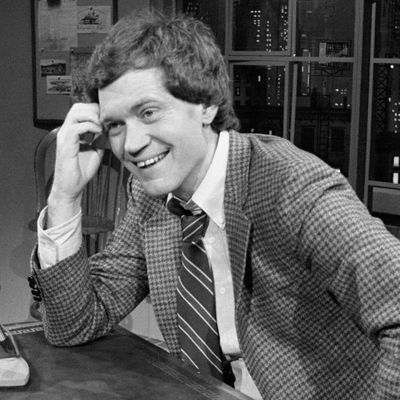
If something as groundbreaking and culturally influential as Late Night With David Letterman were to premiere today, would we recognize it right away? My initial hunch was no — I mean, who among us hasn’t been guilty of a laughably grievous and humiliating misjudgment based solely on a show’s premiere episode? — until I actually went back and watched the very first episode of Late Night and was reminded just how weird and wonderful and obviously groundbreaking it was. If, as has been argued persuasively elsewhere, you can find the seeds of a show’s ending by returning to its beginning, this seems an opportune time to revisit Letterman’s late-night debut, which aired way back on February 1, 1982. And, reader, I’m here to report that it’s not only the most refreshing thing you’d be likely to find on TV 33 years ago, but the most refreshing thing you’d find on TV if they aired it again tonight.
Let me say here that I’m no blind Letterman acolyte; I was slightly too young and too living-in-Canada to be entranced by him in his ‘80s heyday. I’ve always appreciated his astounding influence on the world of television comedy much more than I’ve appreciated his actual televised comedy. (Though I did once laugh so hard while reading a collection of “Top Ten Lists” in a bookstore that I basically started hyperventilating and had to leave the store. This list was the coup de grace.) But right from the very first seconds of that very first episode, we’re reminded just how different and daring Late Night was. The episode opens with Calvert DeForest as Larry “Bud” Melman, intoning like Alfred Hitchcock and paraphrasing from Frankenstein: “We are about to unfold a show featuring David Letterman, a man of science who sought to create a show after his own image, without reckoning upon God. It’s one of the strangest tales ever told.” I’ll venture that Late Night is the first talk show ever to include the words “without reckoning upon God” in its premiere. I’ll also venture that no one, even Letterman, imagined that his strangest tale would unfold for another 33 years.
The debut episode then proceeds in what can only now be called Lettermanesque fashion. (At the time, the New York Times, without access to that adjective, declared, “The program’s overall mix often strains for the unpredictable.”) The post-Melman opening features a group of Rainbow Grill showgirl dancers in ridiculous peacock-feather headdresses. From among the plumes, Letterman emerges, gap-toothed and bemused. And then, miraculously, everything essential is already in evidence, the DNA of the show clearly discernible: the mannerisms, the intonations, the gratuitous shots at his corporate overlords, the unmistakable undertone of cantankerousness that suggests he might rip up the cue cards and stomp off the stage at any time. The first and only celebrity guest is Bill Murray, doing Bill Murray, circa 1982. (Dave’s first show on CBS featured Murray, circa 1993, and later this week we’ll get to see Murray again, doing Bill Murray circa 2015.) The other guest is Don Herbert, a.k.a. Mr. Wizard, in what would become a trademark Letterman bit, i.e., one that both valorizes and satirizes the tropes of classic broadcasting. (Letterman is the man who brought pet tricks back to TV and explicitly labeled them “Stupid Pet Tricks.”) A fake streeter segment asks anonymous New Yorkers what they want to see on late night and they all answer with variations on “demonstrations of various ways of joining metal.” So the show obliges, with bumpers before each commercial break featuring straight-faced demonstrations of welding. This is not just Letterman announcing to the world that he’s got a fresh take on television. It’s Letterman announcing that his fresh take on television will be informed, above all, by the fact that he simultaneously loves television and finds it ridiculous.
This sentiment — that you can both love something and find it ridiculous, and one need not cancel out the other — not only became the dominant mode of TV comedy, it became a dominant mode of consuming popular culture, and persists to this day. You both love the new Taylor Swift video and find it ridiculous, and these sentiments don’t need to feel at odds at all. Letterman is often accused of/credited with fomenting the culturewide triumph of cold, arms-length irony, but more accurately what he did was give us, the audience, permission to love the ridiculous and recognize the ridiculous in what we love, starting with TV. This is actually a perfect kind of gift.
The sensibility evident in Letterman’s first episode is now so familiar as a mode of entertainment — not just from Letterman’s subsequent run but from nearly everything else, post-Letterman — that it’s not surprising to revisit, exactly. What is surprising is just how surprising the rest of that first show still feels. The Melman opening is genuinely weird and startling. The rec-room, can-you-believe-they-gave-us-a-TV-show décor harkens to a time when actively undermining the artifice of TV still felt not just irreverent but borderline seditious. Letterman’s debut, in hindsight, still seems miraculously revolutionary, largely because Letterman had the singular advantage of never having had to follow himself. Every TV comedian who’s come since has had to follow, and reckon with, Letterman, who from his very first hour established himself, even more than the sainted Johnny Carson, as TV’s hardest ever act to follow. Thirty-three years later, that’s still true.




